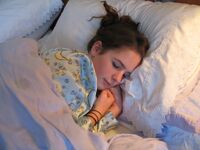Assessment |
Biopsychology |
Comparative |
Cognitive |
Developmental |
Language |
Individual differences |
Personality |
Philosophy |
Social |
Methods |
Statistics |
Clinical |
Educational |
Industrial |
Professional items |
World psychology |
Clinical: Approaches · Group therapy · Techniques · Types of problem · Areas of specialism · Taxonomies · Therapeutic issues · Modes of delivery · Model translation project · Personal experiences ·

In an ideal situation, sleep should be undisturbed and experienced in the same room every night. This girl's room is not sufficiently dark, which is bad sleep hygiene.
Sleep hygiene is the practice of following simple guidelines to ensure restful, effective sleep promoting daytime alertness and helping avoid the onset of sleep disorders. Trouble sleeping and daytime sleepiness can be indications of poor sleep hygiene.
Some measures of sleep hygiene include:
- Going to bed and getting up at the same time each day
- Establishing a regular bedtime routine
- Using relaxation techniques (e.g., meditation) shortly before sleep, allow at least 1 hour to unwind before bedtime.
- Reserving the bedroom for only sleep and sexual activity
- Avoiding large meals within one hour of sleep
- Regular, vigorous, daily exercise, preferably in the morning
- Getting adequate exposure to natural daylight every day
- Avoiding exercise within one hour of sleeping
- Avoiding, if possible, napping during the day
- Keeping the bedroom at a comfortable temperature. It is better for the bedroom to be slightly cooler—losing body heat has been shown to help the onset of slow wave (deep) sleep.
- Keeping the bedroom as dark as possible
- Avoiding stimulants of any kind within one hour of retiring (e.g., caffeine, alcohol) except at the direction of a physician
See also[]
References[]
External links[]
- Virtual Hospital: Psychiatry: Sleep Hygiene
- University of Maryland Medicine Sleep Hygiene
- Tips for a Good Night's Sleep
- 29 Secrets to a Good Night's Sleep
| This page uses Creative Commons Licensed content from Wikipedia (view authors). |